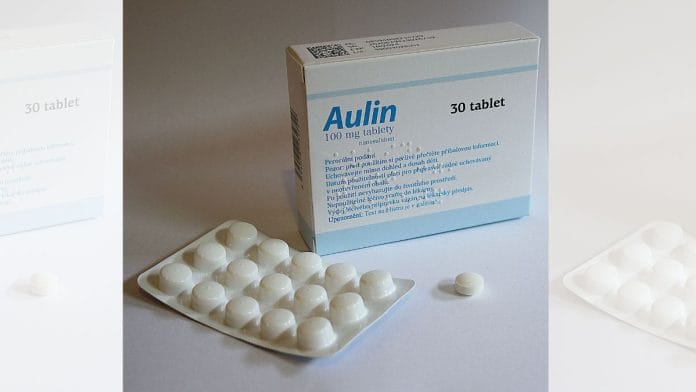New Delhi: A committee under India’s apex drug regulator has recommended against using the popular painkiller nimesulide, or its above-100mg dosage strength in oral formulations, as the first line of treatment. It has also asked the country’s top medical research body for further reviews of its safety in adults.
The drug regulator, the Central Drugs Standard Control Organisation (CDSCO), received the recommendations in the Drug Technical Advisory Board (DTAB) meeting last week. ThePrint has seen the minutes of the meeting.
Last year, the Union health ministry asked the Indian Council of Medical Research (ICMR) to assess nimesulide use in adults amid concerns that it could cause liver damage, which could turn life-threatening in some patients.
The ICMR committee considered recommending an all-India ban on nimesulide to the drug regulator, as ThePrint earlier reported. However, the drug advisory board asked ICMR to carry out a systematic review of nimesulide use in kids under 12, those between 12 and 18, and the 60-plus group before further deliberations. The drug advisory board “opined that nimesulide is one of the effective drugs for reducing fever and used for short-term treatment”, according to the minutes of its meeting.
Now, the CDSCO committee has agreed with the ICMR report—nimesulide should be used only as a second-line drug after exhausting first-line options. According to the expert panel, “all oral formulations of nimesulide above 100 mg in immediate release dosage form should be prohibited”.
Launched in Italy in 1985, nimesulide belongs to a class of drugs, non-steroidal anti-inflammatory drugs or NSAIDs. The US, the UK, Spain, Australia, Canada, Japan, and New Zealand, among others, never approved the drug due to safety concerns.
The Indian drug regulator and advisory board had suggested prohibiting nimesulide for pregnant or lactating women, those planning pregnancy, and people with renal and hepatic impairment. In 2011, India also banned nimesulide for kids under 12 on receiving reports of severe hepatotoxicity in several young patients globally and locally.
Calls to ban nimesulide since the 2000s
Approved in India in 1995, nimesulide treats acute pain or inflammation and fever. Over the years, the drug, however, emerged as a medicine of choice for many physicians for patients with acute pain as nimesulide has a fast onset of action and works by blocking the production of prostaglandins, a chemical associated with pain, thereby offering quick relief from pain and inflammation.
Some physicians indicate that the drug works within 10 minutes of administration.
In the country, the medicine is available under brand names such as Nise, Nimrest, Nimopen, Nimuwin, Nicip, Nodard Plus Nimutab, Nisulid, Nimdase, Nimcap, Nicip-P, and Nimupain, coming under 100- or 200-mg dosage strength.
Doctor Tushar Tayal, an internal medicine consultant with CK Birla Hospital in Gurugram, underlined that despite its effectiveness in managing pain and inflammation, the safety profile of nimesulide raises significant concerns, making it unsuitable as a first-line painkiller.
“One of the most serious adverse effects linked to nimesulide is hepatotoxicity. It has, since then, remained associated with acute liver injury, including liver failure requiring transplantation and even death,” he told ThePrint.
These reactions can occur unpredictably, even after short-term use, and in individuals without prior liver disease, he further pointed out.
Additionally, according to experts, nimesulide has been reported to cause rare but potentially life-threatening skin reactions such as Stevens-Johnson Syndrome (SJS), a severe hypersensitivity reaction characterised by painful skin blistering and mucosal damage, often requiring hospitalisation and intensive care. Although rare, the potential severity of SJS adds another layer of concern over nimesulide.
“Moreover, safer alternatives like paracetamol and ibuprofen are widely available and have a more favourable safety profile. These first-line drugs are effective for mild to moderate pain and fever and are less likely to cause severe liver damage or skin reactions when used appropriately,” the physician added.
The International Society of Drug Bulletins (ISDB), an initiative supported by the World Health Organisation to enhance the sharing of high-quality information on medical treatments and medications between countries, demanded the drug be withdrawn worldwide in 2008. “It offers no therapeutic advantage or better gastrointestinal safety compared with other NSAIDS, whereas it exposes patients to a higher risk of fatal hepatic disorders,” the ISDB had noted.
The calls to ban the drug in India have continued since then. However, the CDSCO officials told ThePrint that the deliberations by the drug regulator had not found strong enough evidence so far.
Following the suggestions by the advisory board, the Union Ministry of Health and Family Welfare banned the veterinary use of the drug, mainly to conserve vultures, in January 2025. The advisory board marked out nimesulide, a widely used painkiller in cattle, as “one of the most important extant risks to the vulture populations in India”.
(Edited by Madhurita Goswami)
Also Read: As CDSCO lifts suspension on eye drops designed to replace reading glasses, makers eye June launch






